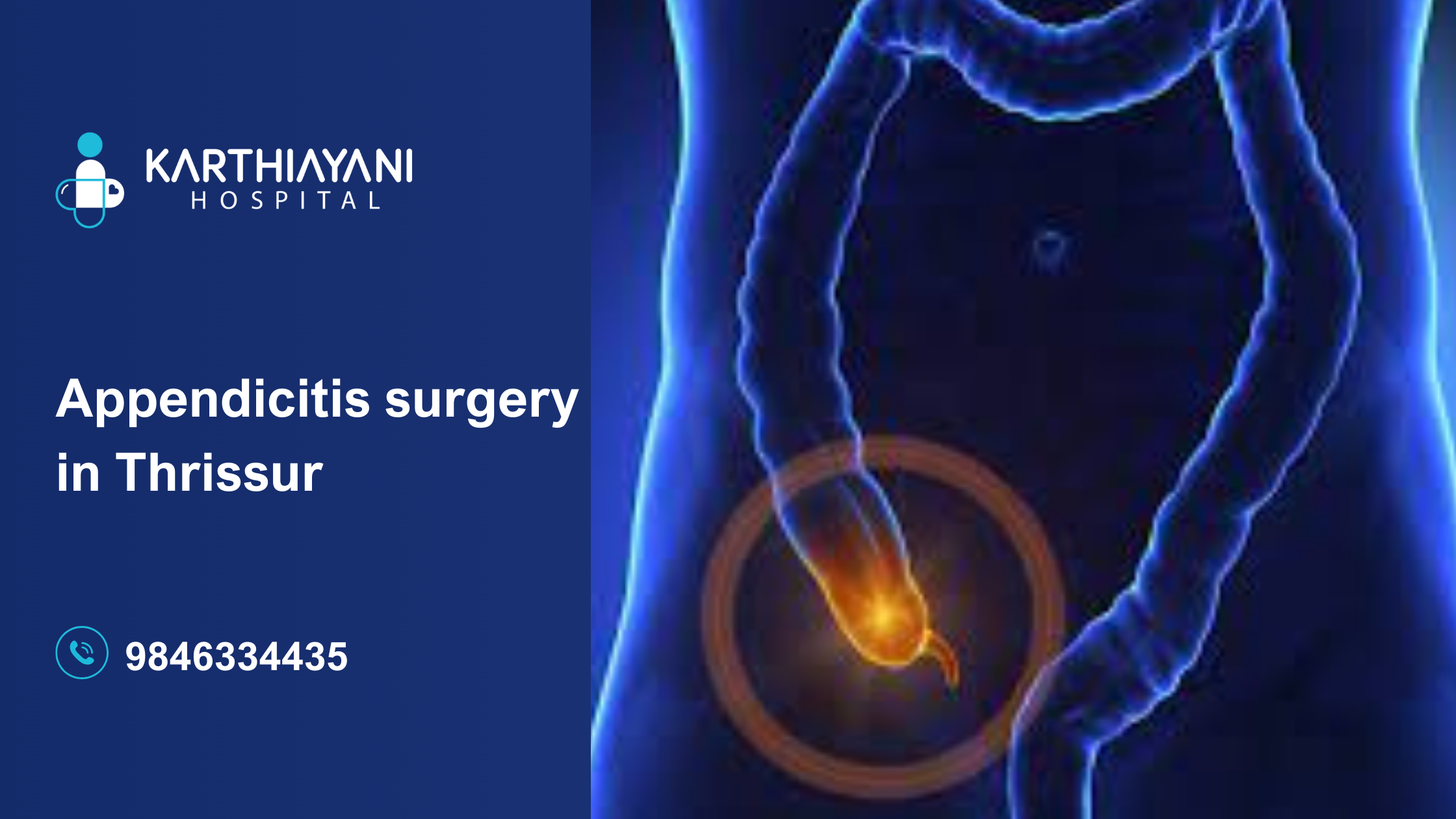
Appendicitis Surgery in Thrissur: A Complete Guide to Safe and Effective Treatment
Appendicitis is a medical emergency that requires immediate attention. If left untreated, an inflamed appendix can rupture, leading to life-threatening complications such as peritonitis or abscess formation. For those seeking appendicitis surgery in Thrissur, Karthiayani Hospital offers state-of-the-art surgical procedures, experienced medical professionals, and a patient-first approach.
In this comprehensive guide, we explore everything you need to know about appendicitis, its symptoms, causes, treatment options, post-surgical recovery, and why Karthiayani Hospital is the best choice for appendicitis surgery in Thrissur.
Understanding Appendicitis
Appendicitis surgery in Thrissur is necessary when the appendix, a small, finger-shaped pouch attached to the large intestine, becomes inflamed due to infection or blockage. This condition causes severe abdominal pain and discomfort, often requiring surgical intervention. While appendicitis can affect people of any age, it is most common in individuals between the ages of 10 and 30.
Types of Appendicitis
-
- Acute Appendicitis – A sudden onset of severe symptoms that require emergency surgery.
-
- Chronic Appendicitis – Persistent or recurrent abdominal pain that develops over time.
-
- Complicated Appendicitis – Appendicitis that has led to abscess formation, rupture, or peritonitis.
Symptoms of Appendicitis
Recognizing appendicitis early can prevent serious complications. The most common symptoms include:
-
- Abdominal Pain: Starts near the belly button and moves to the lower right side.
-
- Pain Worsening Over Time: Increases with movement, coughing, or pressing the area.
-
- Nausea and Vomiting: Often accompany severe pain.
-
- Fever: Mild to moderate fever ranging from 99°F to 100.5°F.
-
- Loss of Appetite: Sudden decrease in food intake.
-
- Swelling or Tenderness: Abdominal bloating or discomfort.
-
- Changes in Bowel Movements: Diarrhea or constipation in some cases.
When to Seek Emergency Medical Help?
If you experience persistent pain in the lower right abdomen along with fever, vomiting, or swelling, seek immediate medical attention.
Causes of Appendicitis
Several factors contribute to appendix inflammation, including:
-
- Blockage of the Appendix – Often due to hardened stool (fecalith), tumors, or infections.
-
- Gastrointestinal Infections – Bacterial or viral infections leading to inflammation.
-
- Family History – Genetics may play a role in appendicitis development.
-
- Dietary Factors – A low-fiber diet may increase the risk.
-
- Inflammatory Bowel Diseases – Conditions like Crohn’s disease may trigger appendicitis.
Diagnosis and Treatment of Appendicitis
Diagnosis
Doctors at Karthiayani Hospital use advanced diagnostic tools, including:
-
- Ultrasound and CT Scans – Detect appendix inflammation.
-
- Blood Tests – Identify infections and elevated white blood cell counts.
-
- Physical Examination – Check for tenderness and pain in the lower abdomen.
Treatment Options
Once diagnosed, doctors recommend treatment based on the severity of the condition.
1. Appendectomy (Surgical Removal of the Appendix)
The most common and effective treatment for appendicitis surgery in Thrissur is an appendectomy, where surgeons remove the infected appendix. This can be performed in two ways:
-
- Laparoscopic Appendectomy: A minimally invasive surgery using small incisions and a camera.
-
- Open Appendectomy: A traditional method involving a larger incision in the lower right abdomen, typically used for complicated cases.
2. Antibiotic Therapy
In mild cases, antibiotics may be used to reduce infection and inflammation. However, surgery remains the most effective treatment for long-term recovery.
Why Choose Karthiayani Hospital for Appendicitis Surgery in Thrissur?
1. Experienced Medical Professionals
Our hospital boasts a team of highly skilled surgeons, anesthetists, and nursing staff dedicated to ensuring a safe surgical experience.
2. Advanced Surgical Facilities
-
- High-tech operating rooms with modern laparoscopic technology.
-
- In-house diagnostics, including ultrasound, CT scans, and blood tests.
-
- Sterile surgical environments to minimize infection risks.
3. 24/7 Emergency Care
Since appendicitis requires urgent treatment, our emergency care unit operates 24/7 to handle critical cases immediately.
4. Post-Surgical Recovery and Care
-
- Personalized recovery plans for faster healing.
-
- Minimal hospital stay with laparoscopic procedures.
-
- Dedicated nursing support for post-operative care.
Post-Surgical Recovery and Lifestyle Changes
Recovery Timeline
-
- 1-2 Days: Most patients can return home within 24-48 hours after laparoscopic surgery.
-
- 1 Week: Resume light activities but avoid strenuous exercises.
-
- 4-6 Weeks: Full recovery and return to normal activities.
Diet and Lifestyle Tips
-
- Eat fiber-rich foods to prevent constipation.
-
- Stay hydrated to aid digestion and recovery.
-
- Avoid heavy lifting during recovery.
-
- Follow post-surgical guidelines provided by the doctor.
Frequently Asked Questions (FAQs)
1. What are the first signs of appendicitis?
Severe pain near the belly button that shifts to the lower right abdomen, nausea, and fever.
2. How long does appendicitis surgery take?
Laparoscopic appendectomy takes about 30-60 minutes, while open surgery may take longer.
3. Can I recover without surgery?
In some mild cases, antibiotics may help, but surgery is the best long-term solution.
4. What is the cost of appendicitis surgery in Thrissur?
Costs vary based on the hospital and type of surgery. Contact Karthiayani Hospital for specific pricing.
5. Is laparoscopic surgery better than open surgery?
Yes, it involves smaller incisions, less pain, and quicker recovery.
6. How soon can I eat after surgery?
You can start with clear fluids a few hours after surgery and return to normal foods gradually.
7. Can appendicitis come back after surgery?
No, once the appendix is removed, appendicitis cannot recur.
8. Is appendicitis more common in children or adults?
It can occur at any age but is more common in people aged 10-30.
9. What happens if appendicitis is left untreated?
A ruptured appendix can cause a severe infection called peritonitis, which can be fatal.
10. How long do I need to stay in the hospital?
Most patients stay for 1-2 days after laparoscopic surgery.